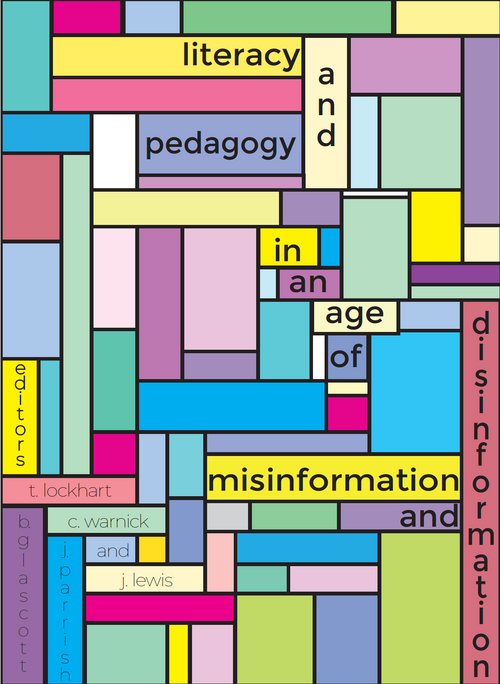AP-NORC (2022, October). Many believe misinformation is increasing extreme political views and behaviors. AP-NORC Center for Public Affairs Research. https://apnorc.org/wp-content/uploads/2022/10/Pearson-Institute-AP-NORC-Poll-Report-on-Misinformation.pdf
Aspen Digital. (2021, November) Commission on information disorder: Final report. https://www.aspeninstitute.org/wp-content/uploads/2021/11/Aspen-Institute_Commission-on-Information-Disorder_Final-Report.pdf
Baldassaro, M., Harbath, K. & Scholtens, M. (2021, August) The big lie and big tech: Misinformation repeat offenders and social media in the 2020 U.S. election. The Carter Center. https://www.cartercenter.org/resources/pdfs/news/peace_publications/democracy/the-big-lie-and-big-tech.pdf
Barrett, P.M. (2022, September) Spreading the big lie: How social media sites have amplified false claims of U.S. election fraud. New York University Stern Center for Business and Human Rights. https://bhr.stern.nyu.edu/tech-big-lie
Common Cause. (2021, October) As a matter of fact: The harms caused by election disinformation. Common Cause Education Fund. https://www.commoncause.org/wp-content/uploads/2021/10/CC_AsaMatterofFact_FINAL_10.27.21.pdf
Congressional Research Service. (2022, August 1) False Speech and the First Amendment: Constitutional Limits
on Regulating Misinformation. CRS Reports. https://crsreports.congress.gov/product/pdf/IF/IF12180
Cuffari, J. V. (2022, August 10). DHS Needs a Unified Strategy to Counter Disinformation Campaigns. Department of Homeland Security. https://www.oig.dhs.gov/sites/default/files/assets/2022-08/OIG-22-58-Aug22.pdf
Deloitte (2022, November). The Future of News | An analysis of future trends, scenarios and initiatives to increase the value of news in 2030. https://www2.deloitte.com/content/dam/Deloitte/nl/Documents/technology-media-telecommunications/deloitte-nl-tmt-future-of-news-report-2022.pdf
GreenTarget (2023, September). NextGen journalists: Navigating misinformation, AI & the future of journalism. https://greentarget.com/wp-content/uploads/2023/09/Greentarget-Future-of-Journalism-Report-2023.pdf
Head, A. J., et al. (2020, January). Information literacy in the age of algorithms. Project InfoLit. https://projectinfolit.org/pubs/algorithm-study/pil_algorithm-study_2020-01-15.pdf
Helmus, T. C. (2022, July). Artificial Intelligence, Deepfakes, and Disinformation. RAND Corporation. https://www.rand.org/content/dam/rand/pubs/perspectives/PEA1000/PEA1043-1/RAND_PEA1043-1.pdf
Howard, P. N., et al. (2021, August). Digital misinformation / disinformation and children. UNICEF. https://www.unicef.org/globalinsight/media/2096/file/UNICEF-Global-Insight-Digital-Mis-Disinformation-and-Children-2021.pdf
Knight Foundation. (2023, January). American Views 2022: Part 2: Trust, Media and Democracy. Knight-Gallup. https://knightfoundation.org/wp-content/uploads/2023/02/American-Views-2022-Pt-2-Trust-Media-and-Democracy.pdf
Media Literacy Now. (2022). U.S. media literacy policy report 2022. https://medialiteracynow.org/wp-content/uploads/2023/05/MediaLiteracyPolicyReport2022.pdf
Monaghan, K. & Rodriguez, C. (2023) Mis-and disinformation: Extremism in the digital age. Counter Terrorism Preparedness Network. https://www.london.gov.uk/sites/default/files/2023-12/CTPN%20Report%202023%20-%20Mis-and%20Disinformation%2C%20Extremism%20in%20the%20Digital%20Age%20%28Single%20Pages%29.pdf
Mont’Alverne, C., et al. (2022, September). The Trust Gap: How and Why News on Digital Platforms Is Viewed More Sceptically Versus News in General. Reuters Institute. https://reutersinstitute.politics.ox.ac.uk/sites/default/files/2022-09/MontAlverne_et_al_The_Trust_Gap.pdf
Newman, N. (2023, June 14). Overview and key findings of the 2023 Digital News Report. Reuters Institute. https://reutersinstitute.politics.ox.ac.uk/digital-news-report/2023/dnr-executive-summary
Pehlivanoglu D., et al. (2022). Aging in an "infodemic": the role of analytical reasoning affect and news consumption frequency on news veracity detection. Journal of Experimental Psychology. Applied 468–485. https://psycnet.apa.org/fulltext/2022-58029-001.pdf
Roozenbeek, J., et al. (2022). Psychological inoculation improves resilience against misinformation on social media. Science Advances. https://www.science.org/doi/10.1126/sciadv.abo6254
Shahi, M. (2023, Sept. 14). Protecting democracy online in 2024 and beyond. American Progress. https://www.americanprogress.org/article/protecting-democracy-online-in-2024-and-beyond/
UNESCO. (2022, May 3). Journalism under digital siege: World Press Freedom Day. UNESCO. https://en.unesco.org/sites/default/files/wpfd_2022_concept_note_en_v5.pdf
World Economic Forum. (2024, Jan. 10). Global risks 2024: Disinformation tops global risks 2024 as environmental threats intensify. UNESCO. https://www.weforum.org/press/2024/01/global-risks-report-2024-press-release/
A Newsy/YouGov poll found Americans trust journalists over family and friends as trustworthy sources of news. (2021, February 1). Newsy/YouGov. https://www.newsy.com/stories/americans-say-facebook-is-biggest-source-of-misinformation/
AP-NORC (2022, October 8). Many believe misinformation is increasing extreme political views and behaviors. AP-NORC Center for Public Affairs Research. https://apnorc.org/wp-content/uploads/2022/10/Pearson-Institute-AP-NORC-Poll-Report-on-Misinformation.pdf
AP-NORC (2021, October). The American public views the spread of misinformation as a major problem. AP-NORC Center for Public Affairs Research. https://apnorc.org/projects/the-american-public-views-the-spread-of-misinformation-as-a-major-problem/
AP-NORC . (2023, November 3). There is bipartisan concern about the use of artificial intelligence in the 2024 elections. AP-NORC Center for Public Affairs Research. https://apnorc.org/projects/there-is-bipartisan-concern-about-the-use-of-ai-in-the-2024-elections/
Bealor, S. (2022, August 11). Large majority think they see misinformation online every week. Poynter. https://www.poynter.org/fact-checking/media-literacy/2022/survey-says-large-majority-think-they-see-misinformation-online-every-week/
Forman-Katz, N. & Jurkowitz, M. (2022, July 13). U.S. journalists differ from the public in their views of ‘bothsidesism’ in journalism. Pew Research. https://www.pewresearch.org/fact-tank/2022/07/13/u-s-journalists-differ-from-the-public-in-their-views-of-bothsidesism-in-journalism/
Klepper, D. (2022, October 12). Most in US say misinformation spurs extremism, hate. Associated Press. https://apnews.com/article/religion-crime-social-media-race-and-ethnicity-05889f1f4076709c47fc9a18dbee818a
Kulke, S. (2023, February 28). Half of Americans uncertain about ability to identify false political claims. Northwestern University. https://news.northwestern.edu/stories/2023/02/survey-half-of-americans-uncertain-about-ability-to-identify-false-political-claims/
Matsa, K.E. (2023, November 15). More Americans are getting news on TikTok, bucking the trend seen on most other social media sites. Pew Research. https://www.pewresearch.org/short-reads/2023/11/15/more-americans-are-getting-news-on-tiktok-bucking-the-trend-seen-on-most-other-social-media-sites/
Sanchez, G.R. et al. (2022, July 26). Misinformation is eroding the public’s confidence in democracy. Brookings Institute. https://www.brookings.edu/blog/fixgov/2022/07/26/misinformation-is-eroding-the-publics-confidence-in-democracy/
St. Aubin, C. & Leidke, J. (2023, July 20). Most Americans favor restrictions on false information, violent content online. Pew Research. https://www.pewresearch.org/short-reads/2023/07/20/most-americans-favor-restrictions-on-false-information-violent-content-online/
UNESCO (2023, September). Survey on the impact of online disinformation and hate speech. https://www.unesco.org/sites/default/files/medias/fichiers/2023/11/unesco_ipsos_survey.pdf
 Literacy and Pedagogy in an Age of Misinformation and Disinformation
by
Literacy and Pedagogy in an Age of Misinformation and Disinformation
by
Curious to know what various research centers and think tanks have to say and report on misinformation and media literacy? Click here to find out!
Or...use the search box below to do your own search of >1200 prominent think tanks.